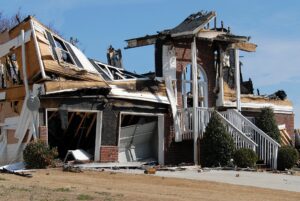If you are considering buying a house in Massachusetts, you will certainly need to think about taking out home insurance cover for it. Your new home will probably be the largest asset you will own, so losing it to a fire, storm, even if only part of it is damaged, could set you back financially for years without insurance. There are various different types of home insurance available and, like auto insurance, it is worth shopping around for the best insurance cover for your own specific needs and budget.
Is home insurance compulsory in Massachusetts?
There is no law in Massachusetts that makes home insurance compulsory. It is your risk. However, if you have a mortgage, your mortgage lender may make it a condition of your home loan that you have adequate home insurance. Some lenders may have the right to make you pay back the full amount you have borrowed if you fail to keep up with insurance payments and there is damage to the property that would otherwise have been covered by insurance.
Assessing the risks to your property
The type of home insurance you choose depends on what you want to insure and an assessment of the risks involved in owning property. The potential risks to your home depend on a number of factors such as:
- How old it is – the older a building is the greater the likelihood that deterioration has occurred somewhere, possibly affecting critical parts of the building such as electrical wiring, plumbing, etc.
- Where it is located – buildings close to the sea may be more prone to storm damage, whereas buildings in low lying places may be more prone to flooding. In some parts of the state, there is a greater fire risk than in other parts, so the distance your building is from the nearest fire service or hydrant is a factor. There may be greater theft and break in risk in some neighborhoods than others.
- The type of building your house is, what the design is and how well it has been constructed – wooden houses have a greater fire risk than houses built of brick or concrete, for instance. Does the building have any security devices or monitors installed?
In addition to intrinsic risk factors, there are risks that occur from time to time because of the weather or other environmental causes. Massachusetts experiences extreme weather at times, especially winter storms, snow and ice. The fact that it is on the Atlantic coast makes extreme weather phenomena more severe at times. Climate change is making weather events more extreme and less predictable, which is certainly becoming an important factor that insurance providers are taking note of.
Types of home insurance to consider when buying a house in Massachusetts
For the purposes of this article it is assumed that you are purchasing a house or detached building. Insurance cover (called a form or policy) for condos, apartments and mobile homes are all somewhat different from that for houses or detached buildings. Renters / tenants may also be looking for their own specific type of home insurance, mostly to cover their personal belongings as the landlord will have insurance to cover risks to the building he/she owns.
In Massachusetts, the two most common types of home insurance for houses are:
- Broad Form insurance or HO-2; and
- Special Form insurance or HO-3.
Broad Form insurance cover sets out exactly what risks the policy covers. Most HO-2 policies include the most common risks (also called perils) that can cause damage to your home. These include damage from storms, fire, hail, lightning, collision by other vehicles including aircraft, damage to pipes such as can happen during deep freezes, fallen objects, such as tree branches or rocks, snow, ice and sleet, theft and vandalism.
Special Form insurance cover tends to be more popular, as these types of policies include most types of potential risk without necessarily naming them. Risks that are not included are stated in the exclusions section. Common exclusions are damage caused by earthquake and fire.
In addition to HO-2 and HO-3, there are more limited insurance cover types, such as fire and extended coverage and dwelling cover, which are cheaper, but protect less of the property associated with your home.
Property coverage and liability coverage
When selecting a home insurance policy, you will want to know what the policy on offer actually covers. Property coverage is basically for the main home building, but it could also include adjacent attached structures such as sheds and garages if they are part of the home. Property coverage may also cover personal belongings in the building if these are lost, destroyed or stolen. Liability coverage is for compensation for any harm that affects anyone else who is legitimately using your property, such as a friend, family member or tradesperson. You may be deemed liable for any harm that happens to them while they are on your property caused by your own negligence in the same way that a supermarket or shopping mall owner may be liable for harm to members of the public using these premises.
Limits to cover and deductibles
Home insurance providers typically offer different maximum amounts of cover and the deductible you have to forfeit if you make a claim. When choosing a policy and negotiating with a provider, you have to think about what the replacement value of your home might be if you have a total loss. Most policies are offered for a year at a time, so you may need to change the limit on your policy as time goes on, as property values change over time, sometimes faster than expected.
Providers may also offer different packages which you can choose how much deductible you are prepared to forfeit. Generally, the cheaper the policy premium, the higher the deductible will be and vice versa.
Note that when applying for insurance from a provider after taking into consideration all the variables, it is then up to the insurer to consider whether they want to offer you a policy or not. They will want to know a lot of details about the home you are buying and you, too before making a decision. It is wise to get quotes from different providers to allow you to make the best choice of home insurance available that suits you and have an alternative insurer you can turn to if your first choice fails to materialize.
For more information, visit our website Mucci Legal or contact us for a free initial legal consultation today.


